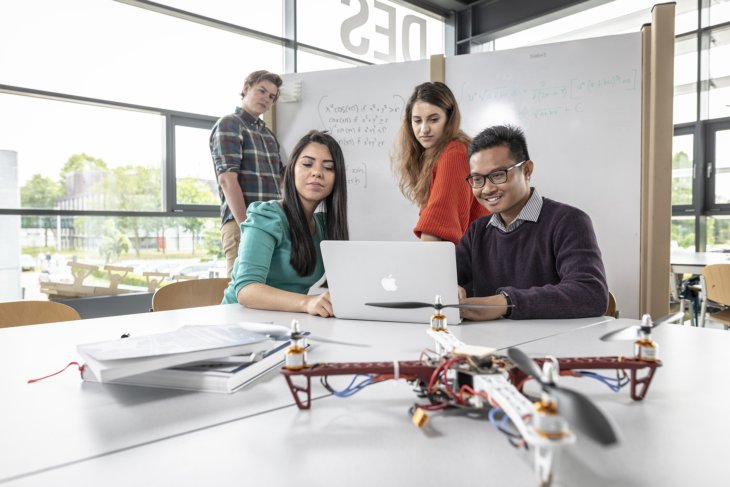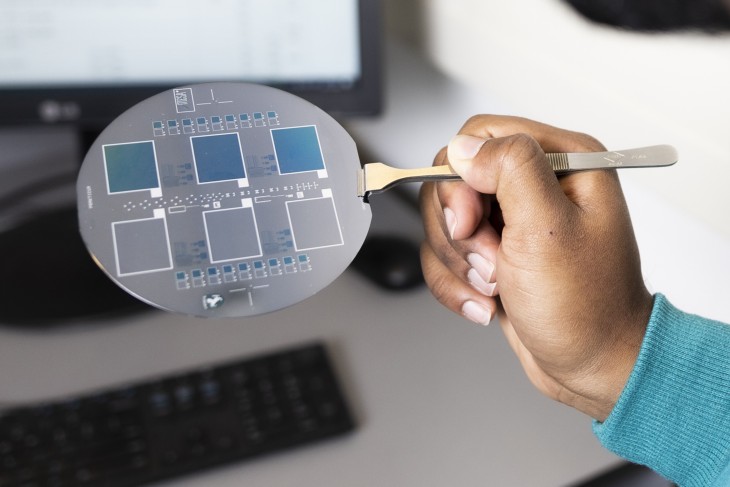Technology is a broad field, allowing you to take many different paths. At the University of Twente (UT), you can choose from a wide range of technical bachelor’s programmes. But what exactly are these studies about? And which one might be the right fit for you? Let’s take a look at ten technical studies in a nutshell!
- Mechanical Engineering
- Electrical Engineering
- Chemical Science & Engineering
- Civil Engineering
- Industrial Design Engineering
- Applied Physics
- Advanced Technology
- Creative Technology
- Technical Computer Science
- Biomedical Technology
Mechanical Engineering
Planes, cars, wind turbines, roller coasters, and robots — all are products of mechanical engineering! In this bachelor’s programme, you’ll learn how to design, develop, and improve machines and systems. Dive into mechanics to understand forces and motion, study energy and heat transfer, and explore the best materials for different applications.
Want to know how a robot moves or how a robotic vacuum navigates? Or whether hydrogen could be the energy source of the future? These are just some of the questions you’ll tackle. One moment, you might delve into the physics behind a plane take-off, and the next, you’ll be designing a machine that doesn’t exist yet. If you’re looking for a degree that combines scientific knowledge and hands-on projects, Mechanical Engineering could be perfect for you!
2. Electrical Engineering
When you think of electrical engineering, you might imagine the electricity that powers your phone, lights, or e-bike. But it’s so much more! With knowledge of electrical engineering, you can secure computers, develop pacemakers, and create chips that make devices faster and more energy-efficient. Even technologies like Bluetooth and Wi-Fi wouldn’t exist without electrical engineering. Fun fact: the inventor of Wi-Fi once studied at the University of Twente!
Electrical Engineering turns science fiction into reality. If you’re excited to dive into electrical circuits, sensors and signal processing, and you want to use this knowledge to invent the technologies of the future, this might be the study programme for you.
3. Chemical Science & Engineering
Do you enjoy chemistry experiments but wonder how they can be applied? Chemical Science & Engineering is all about using chemistry to solve practical problems. From creating new types of medicine to developing sustainable energy solutions and plant-based meat alternatives; chemistry is the starting point for many groundbreaking technologies.
You’ll study molecules and atoms one day and work on massive chemical installations the next. If you’re interested in combining chemistry with physics and math, this study programme is a great fit.
4. Civil Engineering
Civil engineering is all around us; from the roads and bridges we use daily to the dikes and tunnels that shape our environment. This field focuses on designing, building, and maintaining infrastructure. How do you ensure a bridge is safe and sturdy? How can we protect countries from rising sea levels? And how do we prepare roads for self-driving cars?
In this study programme, you’ll explore both the technical and managerial aspects of civil engineering. You’ll study material strength and water flow while learning how to balance the interests of governments, businesses, and the environment. If you’re looking for a degree that combines knowledge of mathematics and physics with management skills, Civil Engineering is the study programme for you.
5. Industrial Design Engineering
Want to combine technology with creativity? Industrial Design Engineering might be for you! This study programme focuses on designing everyday products, like coffee machines, fans, or packaging. You’ll combine creativity with technical knowledge to create practical and attractive designs.
For example, if you want to design a new water bottle, you’ll have to think about its looks, comfort, sustainability, and how it can be efficiently manufactured. Therefore, this broad study helps you develop skills in design, marketing, and production. You won’t just learn to design a product, service, or system—you’ll master the entire design process, from generating ideas to launching your creation in the market. You’ll take courses in subjects like mathematics, graphic design, ergonomics, and marketing. It’s a broad and exciting study where you can combine your creativity, technical skills, and passion for understanding people!
6. Applied Physics
The melting of ice, your reflection in a mirror, static electricity from a balloon—all examples of physical phenomena. But what processes lie behind them? And perhaps more importantly, what can we do with this knowledge? The answer: a lot! Fundamental physics is essential for developing modern technologies we use every day. For example, understanding mirrors—or more precisely, the reflection of light via mirrors—is crucial for creating the chips or cameras in your smartphone. The principle of static electricity is used in printers and copiers. And by studying how ice melts under different temperatures and conditions, we can develop accurate climate models.
Are you fascinated by physics and curious about its real-world applications? Then Applied Physics might be the perfect study programme for you. This degree takes you beyond fundamental knowledge, teaching you how to translate scientific insights into new technological possibilities. From quantum computers to ultra-fast microchips, from enhancing the precision of MRI scans to improving the efficiency of solar panels—this study equips you to make a tangible impact on the future of technology.
7. Advanced Technology
Do all of these studies sound exciting, and do you have trouble deciding between them? Take a look at Advanced Technology! In this Bachelor’s, you’ll explore a wide range of disciplines from the worlds of science and engineering, including electrical engineering, mechanical engineering, chemistry, and physics. It’s an incredibly versatile study where you learn to approach problems from multiple perspectives. After all, one thing is certain in the world of technology: you need knowledge from various fields to develop effective solutions.
Imagine, for instance, designing a car powered by solar energy. You’ll need expertise in electrical engineering to convert solar energy into electricity, but also an understanding of the chemical processes within the solar cells. And what about making the car aerodynamic for smooth movement? For that, you’ll draw from principles from physics and mechanical engineering.
In short, this broad study programme is perfect for anyone eager to speak the language of different types of engineers and use a helicopter view to tackle diverse challenges. An added bonus: after completing this bachelor’s, you’ll have plenty of possibilities to specialise, as you’ll be eligible for a wide range of technical master’s programmes!
8. Creative Technology
Are you bursting with creative ideas? In Creative Technology, you’ll dive into electrical engineering and computer science, using this knowledge to create smart, innovative, and meaningful solutions for societal challenges. The results can be as original as they are impactful: think educational VR environments, a walker designed for children, or a sweatshirt that displays your mood—nothing is too out there in Creative Technology.
Throughout the courses, you’ll explore topics like artificial intelligence, programming, electronic circuits, sensors, design, and human-computer interaction, among many others. One moment, you’ll delve into the mathematics behind AI, and the next, you’ll learn about animating games, culminating in designing your very own 3D game.
If you’re searching for an innovative study that lets your creativity shine, make sure to check out Creative Technology!
9. Technical Computer Science
Games, navigation systems, online banking, chatbots—none of these everyday conveniences would exist without computers and data. In Technical Computer Science (Informatics), you’ll dive into the software systems, computer networks, algorithms, and other technologies that make these innovations possible. You’ll learn how computers work, what they’re capable of, and how to develop smart solutions—across any field. After all, computers are everywhere!
Throughout this study, you’ll become an expert in programming, data and information, artificial intelligence, and building sustainable and secure software. A keen interest in computer science, mathematics, and technology is essential because you’ll be working at the cutting edge of the latest developments.
Sounds exciting? Can’t wait to turn your passion for computers into a career? Then Technical Computer Science is the right choice for you!!
10. Biomedical Technology
Technological innovations are playing an increasingly important role in healthcare. Think of prosthetics, artificial organs, implants, and even medical robots. In the Dutch-taught study programme Biomedical Technology, you’ll learn how to use technology to solve complex medical problems. By combining medical knowledge with technical skills, you’ll design cutting-edge technologies and develop the medical tools of the future.
As an aspiring medical engineer, you have a passion for both healthcare and technology. An interest in physics, biology, mathematics, mechanical engineering, and electrical engineering is essential, as these fields provide the knowledge needed to analyse clinical challenges and translate them into tangible technological solutions.
Does this sound like your dream study programme? And do you love coming up with out-of-the-box ideas? Then Biomedical Technology might be the perfect fit for you!
What’s Next?
Found a study that interests you? Check the admission requirements to ensure you’re eligible. Most of these studies require advanced mathematics, and some also require physics and/or chemistry.
Still unsure about what study programme suits you best? Visit the University of Twente! Attend an Open Day or plan an online meet-up with a student to experience a study firsthand. Whatever you choose, a technical study sets you up for an exciting future full of opportunities!




